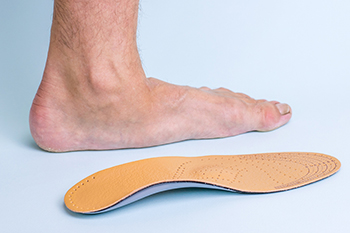Will Orthotics Help With Flat Feet?

Flat feet, or fallen arches, are a common condition that can lead to discomfort and pain in the feet, knees, and even the lower back. Walking and standing for long periods can be uncomfortable in people with collapsed arches. Also, due to lack of a supportive arch, there can be substantial pressure on other parts of the foot, causing problems with posture and foot movement. A fallen arch can also strain the ligaments and tendons of the foot and leg. One solution to overcoming the discomfort of having flat feet is wearing orthotic inserts in your shoes. It’s important to have an insole that strikes the right balance between rigidity and flexibility. Insoles that are too firm may lack the proper amount of shock absorption, while overly cushioned insoles may not provide the support necessary to counteract flat feet. People with problematic flat feet may wish to consider investing in orthotics that are made especially for their feet. A podiatrist can examine your feet and make molds for orthotics that are individualized for you. Because the feet may need some time to adapt to the changes provided by insoles, it is a good idea to gradually increase the time you wear them in the beginning. For help with flat feet and custom orthotics, it is suggested that you make an appointment with a podiatrist.
If you are having discomfort in your feet and would like to try orthotics, contact Janale Beckford, DPM from Tampa Podiatrists . Our doctor can provide the care you need to keep you pain-free and on your feet.
What Are Orthotics?
Orthotics are inserts you can place into your shoes to help with a variety of foot problems such as flat feet or foot pain. Orthotics provide relief and comfort for minor foot and heel pain but can’t correct serious biomechanical problems in your feet.
Over-the-Counter Inserts
Orthotics come in a wide variety of over-the-counter inserts that are used to treat foot pain, heel pain, and minor problems. For example, arch supports can be inserted into your shoes to help correct overarched or flat feet, while gel insoles are often used because they provide comfort and relief from foot and heel pain by alleviating pressure.
Prescription Orthotics
If over-the-counter inserts don’t work for you or if you have a more severe foot concern, it is possible to have your podiatrist prescribe custom orthotics. These high-quality inserts are designed to treat problems such as abnormal motion, plantar fasciitis, and severe forms of heel pain. They can even be used to help patients suffering from diabetes by treating foot ulcers and painful calluses and are usually molded to your feet individually, which allows them to provide full support and comfort.
If you are experiencing minor to severe foot or heel pain, it’s recommended to speak with your podiatrist about the possibilities of using orthotics. A podiatrist can determine which type of orthotic is right for you and allow you to take the first steps towards being pain-free.
If you have any questions please contact our office located in Tampa, FL . We offer the newest diagnostic and treatment technologies for all your foot and ankle needs.
More about Foot Orthotics
Orthotics are shoe inserts that are meant to correct an irregular walking gait or provide cushioning to the feet. Orthotics come in a variety of different models and sizes, including over-the-counter and customizable variants. Customizable orthotics can be shaped and contoured to fit inside a specific shoe and are typically prescribed through a podiatrist who specializes in customized footwear and orthotics design and management.
Orthotics are beneficial because they can help prevent injuries from occurring and provide cushioning to keep pain levels down to a minimum. They also allow for the correct positioning of the feet. Orthotics can act as shock absorbers to help remove pressure from the foot and ankle. Therefore, orthotics can make bodily movements, such as walking and running, become more comfortable as well as help prevent the development of certain foot conditions.
Orthotics alleviate pain and make the foot more comfortable by slightly altering the angle at which the foot strikes the ground surface, therefore controlling the movement of the foot and ankle. Orthotics come in different variants and can be made of various materials. To determine what type of orthotic is most suited to your feet and your needs, it is best to consult your podiatrist. He or she will be able to recommend a type of orthotic that can help improve your foot function or prescribe a custom orthotic to best fit your feet.
